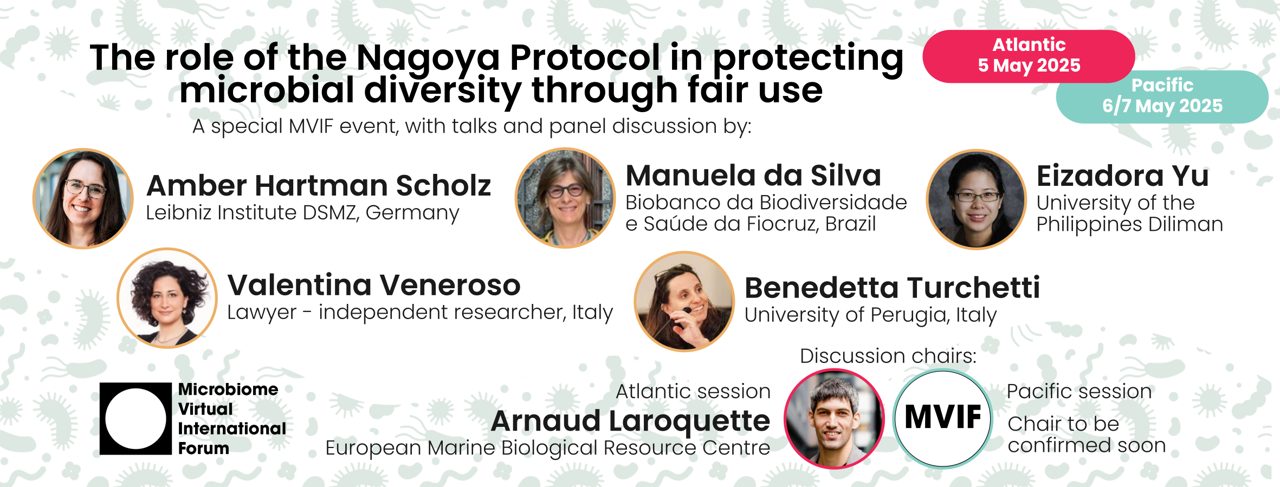The role of the Nagoya Protocol in protecting microbial diversity through fair use
A special MVIF event, with talks and panel discussion by:
- Dr. Amber Hartman Scholz, Leibniz Institute DSMZ, Germany
- Dr. Manuela da Silva, Biobanco da Biodiversidade e Saúde da Fiocruz, Brazil
- Dr. Valentina Veneroso, Italy
- Dr. Benedetta Turchetti, University of Perugia, Italy
- Dr. Eizadora Yu, from the University of the Philippines Diliman, will join the Pacific discussion.
The discussion will be chaired by Dr. Arnaud Laroquette, Access and Benefit Sharing (ABS) Compliance Officer at the European Marine Biological Resource Centre (EMBRC)
The panel will follow a session of contributed talks. Details about the contributed talks can be found below.
1. Introduction: Where did the Nagoya Protocol come from?
by Dr. Amber Hartman Scholz, Leibniz Institute DSMZ, Germany
At the UN Biodiversity Conference (COP16) in Cali, Colombia in October 2024 new decisions were reached on how benefits can and should be shared from digital sequence information (DSI). The COP16 DSI Decision 16/2 operationalizes a new benefit-sharing mechanism under the Convention on Biological Diversity (CBD) and creates new financial obligations for commercial users of DSI through a sector-based multilateral mechanism called the Cali Fund. The decision also ensures that non-commercial users of DSI can continue to publish in and use sequences in open access databases although DSI databases have new requirements imposed on them. This benefit-sharing approach differs from the bilateral approached under the CBD's Nagoya Protocol. The talk will explain what the DSI decision means for “real-world” scientists, database managers, and users of sequence data. And, in parallel, show what science policy work entails and what is happening on the ground during UN negotiations.
2. Examples from Brazil, India and South Africa of the challenges and difficulties encountered in implementing ABS
by Dr. Manuela da Silva, Biobanco da Biodiversidade e Saúde da Fiocruz, Brazil
Restrictions placed on the distribution of biological material by the legislation of countries such as India, South Africa, or Brazil exclude strains that could serve as type material for the validation or valid publication of prokaryotic species names. This problem goes beyond prokaryotic taxonomy and is also relevant for other areas of biological research.
3a. Researcher’s Toolkit: Practical Tips on ABS Compliance - Part 1
by Dr. Valentina Veneroso, Italy
Part. 1 - The presentation will focus on the legal obligations under Access and Benefit-Sharing (ABS) within research projects, outlining the complex and multilayered compliance requirements researchers must navigate. It will also examine the potential consequences of non-compliance with these obligations.
3b. Researcher’s Toolkit: Practical Tips on ABS Compliance - Part 2
by Dr. Benedetta Turchetti, University of Perugia, Italy
Part. 2 - The process for ensuring compliance with Access and Benefit Sharing (ABS) regulations under the Nagoya Protocol will be briefly outlined with practical guidance provided. It is essential to first assess whether the material in question falls under ABS legislation, particularly if it originates from countries asserting sovereign rights over their genetic resources. Where applicable, authorization must be obtained through Prior Informed Consent and Mutually Agreed Terms. Appropriate documentation—such as the Internationally Recognized Certificate of Compliance and Material Transfer Agreement—must be secured.
4. What should I know about Digital Sequence Information (DSI) and sharing benefits under the CBD?
by Dr. Amber Hartman Scholz, Leibniz Institute DSMZ, Germany
At the UN Biodiversity Conference (COP16) in Cali, Colombia in October 2024 new decisions were reached on how benefits can and should be shared from digital sequence information (DSI). The COP16 DSI Decision 16/2 operationalizes a new benefit-sharing mechanism under the Convention on Biological Diversity (CBD) and creates new financial obligations for commercial users of DSI through a sector-based multilateral mechanism called the Cali Fund. The decision also ensures that non-commercial users of DSI can continue to publish in and use sequences in open access databases although DSI databases have new requirements imposed on them. This benefit-sharing approach differs from the bilateral approached under the CBD's Nagoya Protocol. The talk will explain what the DSI decision means for “real-world” scientists, database managers, and users of sequence data. And, in parallel, show what science policy work entails and what is happening on the ground during UN negotiations.
Contributed talks
1. The Microbiota Vault's equitable biobanking framework
by Maria Gloria Dominguez Bello, Rutgers, The State University of New Jersey
Drawing inspiration from the Svalbard Global Seed Vault, the Microbiota Vault represents a global initiative to safeguard microbiomes across human, animal, and environmental domains. Operating as a non-profit charity, the Microbiota Vault, acts at the request and on behalf of sovereign depositors worldwide, who have local working collections, to preserve backup copies of specimens of human or environmental origin. Depositors retain full control over the specimens they deposit in the Microbiota Vault. Upon explicit request by the depositing collections, sequence annotation of deposited materials will be provided and included in open-access databases. Making the annotated samples visible aims at creating a catalog of microbial diversity and empowers local working collections by connecting them to global research efforts. We will discuss our experiences when setting up this biobanking framework and how it relates to the principles of access and benefit sharing and to developments with respect to Digital Sequence Information.

